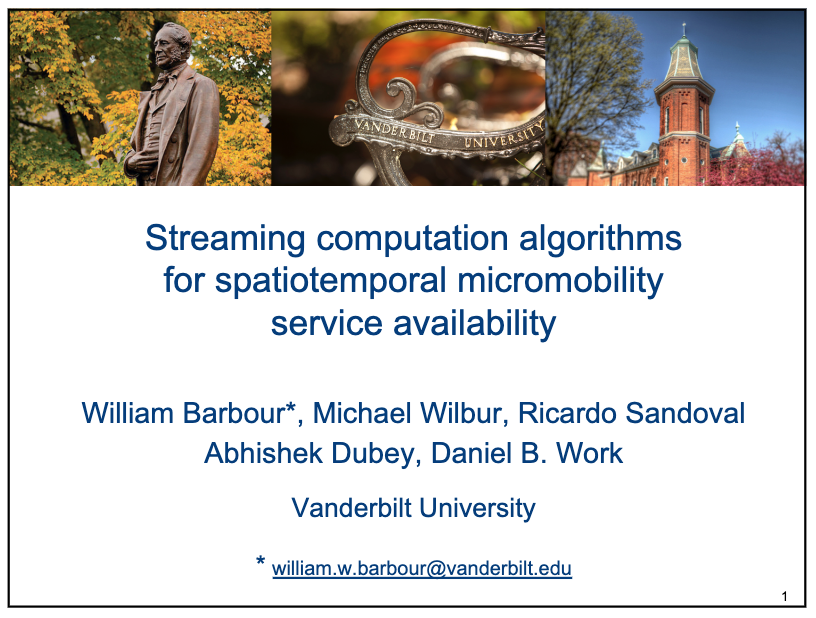Streaming Computation Algorithms for Spatiotemporal Micromobility Service Availability
Submitted by William Barbour
on
Dr. William Barbour is a Research Scientist at the Institute for Software Integrated Systems at Vanderbilt University. He completed his Ph.D. at Vanderbilt University under the supervision of Prof. Dan Work. William's research focuses on computational technologies in transportation systems. This involves big data analysis, machine learning, high-fidelity modeling, and experimentation on emerging transportation technologies.
ABSTRACT

View Slides | Download
Location-based services and fleet management are important components of modern smart cities. However, statistical analysis with large-scale spatiotemporal data in real-time is computationally challenging and can necessitate compromise in accuracy or problem simplification. The main contribution of this work is the presentation of a stream processing approach for real-time monitoring of resource equity in spatially-aware micromobility fleets. The approach makes localized updates to resource availability as needed, instead of batch computation of availability at regular update intervals. We find that the stream processing approach can compute, on average, 62 resource availability updates in the same execution time as a single batch computation. This advantage in processing time makes continuous real-time stream processing equivalent to a batch computation performed every 15 minutes, in terms of algorithm execution time. Since the stream processing approach considers every update to the fleet in real-time, resource availability is always up-to-date and there is no compromise in terms of accuracy.
Dr. William Barbour is a Research Scientist at the Institute for Software Integrated Systems at Vanderbilt University. He completed his Ph.D. at Vanderbilt University under the supervision of Prof. Dan Work. William's research focuses on computational technologies in transportation systems. This involves big data analysis, machine learning, high-fidelity modeling, and experimentation on emerging transportation technologies.
ABSTRACT
 |
| View Slides | Download |
Location-based services and fleet management are important components of modern smart cities. However, statistical analysis with large-scale spatiotemporal data in real-time is computationally challenging and can necessitate compromise in accuracy or problem simplification. The main contribution of this work is the presentation of a stream processing approach for real-time monitoring of resource equity in spatially-aware micromobility fleets. The approach makes localized updates to resource availability as needed, instead of batch computation of availability at regular update intervals. We find that the stream processing approach can compute, on average, 62 resource availability updates in the same execution time as a single batch computation. This advantage in processing time makes continuous real-time stream processing equivalent to a batch computation performed every 15 minutes, in terms of algorithm execution time. Since the stream processing approach considers every update to the fleet in real-time, resource availability is always up-to-date and there is no compromise in terms of accuracy.